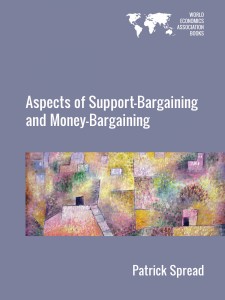Aspects of Support-Bargaining and Money-Bargaining
Patrick Spread
Neoclassical theory conceives a model in which rational choice gives rise to equilibrium with an optimal allocation of resources. Money-bargaining suggests the pursuit of situation-related interests, giving rise to an evolutionary process of exchange using money as a bargaining counter.
‘Aspects of Support-Bargaining and Money-Bargaining’ comprises eight articles dealing with different aspects of money-bargaining and the associated process of support-bargaining. Support-bargaining is triggered by the human sense of insecurity, causing people seek the support of others. It leads to group formation and a group confidence that generates cultural evolution. ‘Money’ and ‘money-bargaining’ are outcomes of cultural evolution, with a dynamic that mimics support-bargaining.
Two articles in particular cover important aspects of money-bargaining and contrast it most sharply with the neoclassical approach. The first of these concerns the situation-related identification of interests. This feature gives rise to the evolutionary dynamic of money-bargaining. The second describes the concept of companies as specialist money-bargaining agencies formatting to achieve viability. This understanding of companies gives issues of technology and spatial location a prominence consistent with observation but markedly lacking in neoclassical theory. The Introduction gives a short account of the origins and development of the theory of support-bargaining and money-bargaining.
About the author
The idea of support-bargaining and money bargaining arose from dissonance between theoretical ideas encountered on the degree course in Politics, Philosophy and Economics at Oxford University and subsequent experience as a ‘working economist’ in London and overseas. The academic background to the theory was researched on a doctoral programme at the London Business School, resulting in the publication of A Theory of Support and Money Bargaining in 1984. In the ‘down time’ from various overseas assignments the harmony of theory and experience has been further established in books and articles. More recently, settled near Oxford, it has been possible to give full attention to the development of theory.
Contents
Introduction
- Blau’s Exchange Theory, Support and the Macrostructure
- Lindblom, Wildavsky and the Role of Support
- The Political Significance of Certain Types of Group
- Intellectual Support-Bargaining and Mannheim’s Conjectures on a Science of Politics
- Situation as Determinant of Selection and Valuation
- Science and Support: The Struggle for Mastery in Economics
- Asymmetric Information, Critical Information and the Information Interface
- Companies and Markets: Economic Theories of the Firm and a Concept of Companies as Bargaining Agencies
You will have the option to download this book in PDF, EPUB (suitable for iOS) and MOBI (suitable for Kindle) formats.
Endorsements
Patrick Spread is a maverick of the mavericks in the sense that although he offers an original approach to the study of economies, he does so without any of the obsessiveness and self-aggrandizement that often characterizes the writing of such authors. That and, more importantly, the fact that Spread’s approach really does in a broad way increase our understanding of how real-world economies do and do not work explain why his writing is now so in demand by major publishers – two books recently by Routledge and now this one by WEA Books. Read Spread’s Aspects of support-bargaining and money-bargaining and you will be both wiser and pleasantly surprised.
Edward Fullbrook – University of the West of England
| ISBN (eBook): | 978-1-911156-18-5 |
